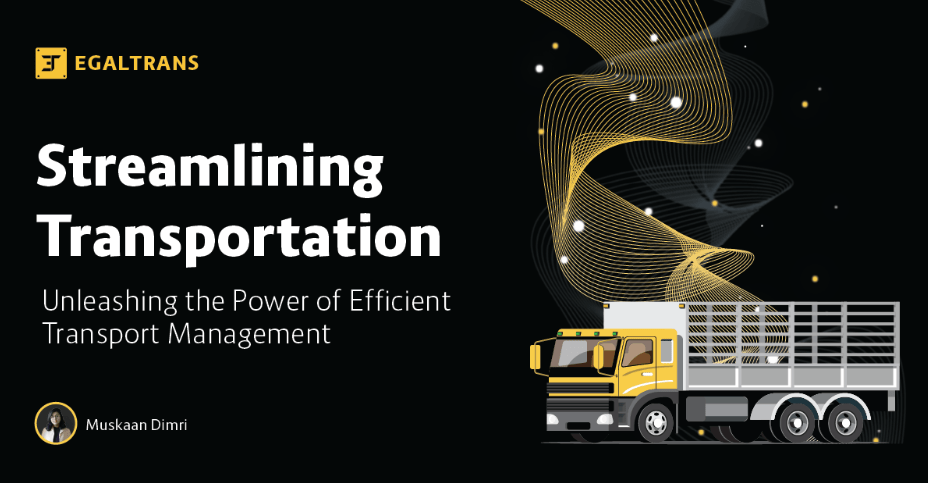In an era where transportation plays a pivotal role in global connectivity and economic growth, optimizing its operations has become more important than ever. From local logistics to global supply chains, the efficient movement of goods and people is crucial for businesses, communities, and the environment alike. In this blog, we will delve into the fascinating world of efficient transport management, exploring the innovative strategies, technologies, and best practices that are revolutionizing the way we move, especially for truck owners and operators.
We will examine how effective transportation management systems enhance operational efficiency, reduce costs, and create sustainable transportation networks that benefit both businesses and society as a whole.
How is Transportation Management Evolving
Transportation management has evolved significantly over the years, driven by advancements in technology, changing consumer expectations, and the growing need to address environmental concerns. Today, optimizing transportation goes beyond simply getting from point A to point B. It encompasses a comprehensive approach that considers factors such as route planning, load optimization, carrier selection, real-time tracking, and data analysis.
Efficient transportation management refers to the strategic planning, coordination, and optimization of transportation activities to achieve cost-effective and sustainable movement of goods and people. It involves implementing strategies, leveraging technology, and adopting best practices to streamline operations, reduce waste, and enhance overall performance. Efficient transportation management requires a holistic approach, integrating various elements such as route planning, load optimization, technology adoption, and sustainability considerations. By focusing on these key aspects, businesses can achieve cost savings, improve customer satisfaction, reduce environmental impact, and gain a competitive advantage in today’s dynamic transportation landscape.
Some major factors governing efficient transportation management are:
- Effective Route Planning: Analyzing transportation routes and selecting the most optimal paths to minimize distances, reduce fuel consumption, and optimize delivery schedules. Utilize advanced route optimization software that factors in variables such as traffic conditions, weather, and vehicle capacity.
- Carrier Selection and Collaboration: Establish strong relationships with reliable carriers and freight partners. Collaborate closely to align objectives, improve communication, and ensure seamless operations. Conduct regular performance evaluations to track carrier performance and make informed decisions.
- Real-time Tracking and Visibility: Leverage technology such as GPS tracking systems and supply chain visibility platforms to monitor shipments in real-time. This provides valuable insights into the location, condition, and status of goods, enabling proactive issue resolution and effective communication with stakeholders.
- Sustainable Practices: Incorporate sustainability into transportation management by adopting eco-friendly practices. This may include utilizing alternative fuel vehicles, optimizing routing to reduce emissions, implementing green packaging solutions, and promoting collaboration to reduce empty trips and optimize resource utilization.
- Automation and Digitization: Embrace technology and automate manual processes wherever possible. Implement transportation management systems (TMS) to streamline operations, enhance visibility, and facilitate data-driven decision-making. Utilize electronic documentation, digital communication channels, and integrated platforms to reduce paperwork and improve efficiency.
Building a Dream Team for Efficient Transport Management
Building a champion team depends on the specific goals and requirements of the team and the industry it operates in. However, here are some professionals that are commonly considered essential for a well-rounded champion team:
- Transport Operations Manager: This person is in charge of managing and organizing every aspect of the transport division. They create and put into action ideas to streamline transportation processes, effectively use available resources, and guarantee timely delivery of cargo or passengers. The transport operations manager manages scheduling, keeps track of performance indicators, and resolves any unexpected operational issues.
- Logistics Specialist: The transportation of passengers or commodities can be greatly improved with the help of a logistics specialist. In order to choose the best means of transportation, negotiate with carriers, and plan routes, they assess the supply chain and weigh their possibilities for getting there. The logistics expert wants to increase the shipping operation’s overall efficiency, reduce costs, and streamline processes.
- Traffic Management Expert: This role involves in-depth knowledge of traffic management principles, regulations, and technologies. The traffic management expert analyzes traffic patterns, studies congestion points, and identifies opportunities to optimize routes. They work closely with transport planners, local authorities, and traffic management agencies to implement strategies that reduce travel time, minimize congestion, and improve overall traffic flow.
- Supply Chain Analyst: The supply chain analyst focuses on evaluating the entire supply chain process to identify areas for improvement. They analyze data, conduct performance evaluations, and use predictive analytics to forecast demand. The supply chain analyst collaborates with other team members to optimize inventory management, streamline transportation processes, and enhance overall supply chain efficiency.
- Safety and Compliance Officer: In transport management, it is crucial to ensure compliance and safety. This position is in charge of overseeing and enforcing compliance with safety and transportation laws. They carry out driver training programs, keep track of safety inspections, and apply safety measures to reduce risks related to transportation operations. The safety and compliance officer also keeps up with industry rules and counsels the group on what needs to be done.
- Customer Service Representative: Excellent customer service is crucial in transport management, especially in passenger transport or logistics services. A customer service representative acts as a liaison between the transport team and clients. They handle customer inquiries, provide updates on deliveries, address complaints, and ensure a positive customer experience. They work closely with the transport operations manager and logistics specialist to meet customer expectations and maintain strong client relationships.
- Environmental Sustainability Coordinator: A coordinator for environmental sustainability works to spread eco-friendly behaviors across the transportation crew in light of the rising emphasis on sustainability. They look for ways to cut carbon emissions, put alternative fuels into use, and incorporate environmentally friendly programs into transportation operations. Together with other team members, the coordinator may design plans for implementing electric car adoption, improving route planning for fuel economy, and reducing the environmental impact of transportation activities.
To truly unleash the power of efficient transport management, organizations must foster a culture of continuous improvement and collaboration within the champion team. Regular evaluations, feedback mechanisms, and training programs help the team stay updated with industry advancements and leverage emerging technologies effectively. In conclusion, by assembling a champion team and streamlining transportation processes, organizations can unlock the true potential of efficient transport management. This not only leads to cost savings and operational efficiencies but also strengthens customer relationships and positions the organization for sustained success in an increasingly competitive market.






